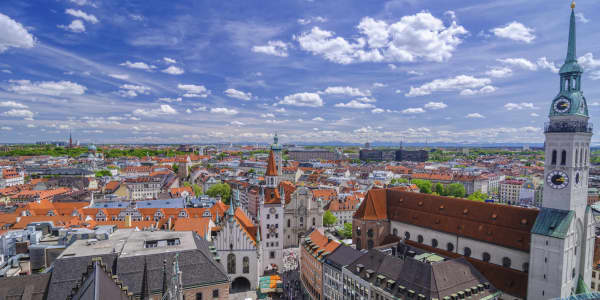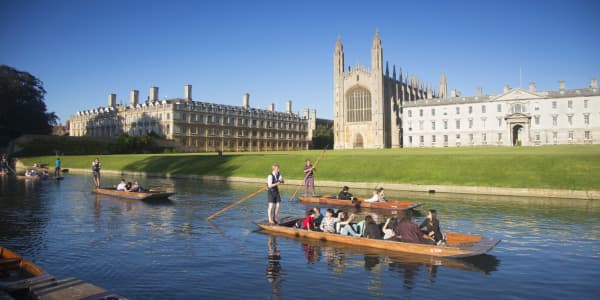Late nights on the town, independence and unfettered ambitions: being young can be a whirlwind of fun and opportunity. But, for the young, some cities are better than others at looking after their needs. The Youthful Cities Index has graded the world's top cities on how well they cater for the young.
CNBC presents the top 10 and gives you the chance to vote here about whether you agree with their choice.
It's important for cities to attract the young, ambitious and innovative -- because the more youthful an area, the better the environment for nurturing new business.
And with over half the world's population now aged under 30 -- and the same proportion living in an urban environment – looking after the young inhabitants of a city has never been more important.
In the Youthful Cities Index, the first survey of its kind, 25 cities were compared using 80 indicators across 16 categories, covering everything from diversity and civic participation to entrepreneurship and environmental sustainability.
By Anmar Frangoul, Special to CNBC.com
Clarification: This introduction has been amended to reflect the methodology used when compiling The Youthful Cities Index.
(10) Seoul
Seoul, the capital of South Korea, finished first overall in the environmental sustainability category.
The city, with a population of over 10 million, has invested time and money in sustainable development research and initiatives, focusing on green technology and access to energy.
Examples of this commitment include the Cheonggyecheon Restoration Project, which saw an elevated highway demolished and an underground 5.8 km waterway restored to create a green, pedestrian-friendly corridor.
(9) Tokyo
Japan's mega-city, Tokyo, finished first overall in the economic status category and pushes to cater for the appetites of tech-hungry creatives.
The star attraction at this year's Tokyo International Robot Exhibition, which nearly 300 firms attended, was a "pneumatic muscle suit" designed and developed by a team at The Tokyo University of Science. Powered by compressed air and worn as a backpack, the suit provides extra power to a user's hips and back when lifting sick or elderly patients out of bed.
With over 30 million people in Japan now over 65 — and the country's Health and Welfare ministry estimating that by 2060, 40 percent of the population will be of retirement age — the country's best minds are attempting to pre-empt a care crisis by developing cutting edge technology like this.
(8) Los Angeles
California's City of Angels came top in The Youthful Cities Index's entrepreneurship category, with over 800 startups in the Los Angeles area, according to the Represent LA website.
The city is home to "Silicon Beach," a technology community in the Venice Beach and Santa Monica areas where smaller startups brush shoulders with internet giants such as Google.
It helps that LA universities produce more engineering graduates than the famed Silicon Valley, and authorities are looking to harness that talent. The Bixel Exchange was launched by the Los Angeles Area Chamber of Commerce to help startups develop and grow by connecting them with government and private companies, such as Microsoft and Siemens.
(7) London
London – where over 300 languages are spoken – finished second in diversity, and led Europe when it came to environmental sustainability.
Earlier this year, the British government announced that London would be home to the Future Cities Catapult center, a "global center of excellence on urban innovation."
The center will look at ways to integrate city services from transport and energy to health and public safety, in an effort to boost the economy, protect the environment and improve quality of life.
London is also a leader in green architecture. Examples include the world's first skyscraper with integrated wind turbines, and Central St Giles, a building which has a biomass boiler using sustainably-sourced wood pellets and green roofs that soak up rainfall and prevent heat building up in the summer.
(6) Chicago
The Windy City finished second overall in the category covering public space, sports and gaming. Chicago is home to 580 parks, contains over 8,000 acres of green space and has a history of green innovation.
In 2001, its City Hall became the first municipal building in the United States to have a "green roof" (pictured) -- packed with 20,000 herbaceous plants -- that reduces the effects of an urban heat island.
According to the United States Environmental Protection Agency, the City Hall's roof is roughly 80 degrees Fahrenheit cooler than its neighboring conventional roof.
The city also holds the Chicago Innovation Award, an annual competition which aims to encourage new technologies and recognizes the most forward thinking businesses in the Chicago area.
(5) Paris
Perhaps unsurprisingly, Paris finished top in the fashion and art category of The Youthful Cities Index.
The French capital also topped the list for digital access. From 2016, Paris will be home to the world's largest digital business incubator in the Halle Freyssinet building -- a renovated freight station in the center of the city.
Covering 30,000 square meters, the building will house 1,000 startups. Organizers of the project hope that it will "encourage the development of a whole digital ecosystem by facilitating the sharing of experience and knowledge."
(4) Dallas
Dallas, Texas, finished first overall in the public space, sports and gaming category, and placed second in entrepreneurship.
Klyde Warren Park opened in October 2012 as part of Dallas' commitment to beautifying the city of 1.2 million people. Built over an eight-lane freeway, the five-acre park connects the city's Uptown neighborhood with the Dallas Arts District and downtown.
The green space has 37 native plant species and 322 trees, creating an urban oasis where there was once only traffic and fumes.
(3) New York City
New York City performed strongly in the civic participation category, and came first in youth employment.
In 2013, the city's Summer Youth Employment Program gave over 35,000 young people aged between 14 and 24 paid summer work for up to six weeks in July and August.
The city also scored highly in education: three years ago, the New York City Department of Education launched Innovation Zone (iZone), an office dedicated to transforming and personalizing learning in schools across the city.
One facet of iZone is iLearnNYC, which has extended the use of online learning in the city, giving teachers, students and parents access to cutting edge educational resources both in the classroom and at home.
(2) Berlin
Germany's capital city came first in the music and film category, reflecting its nonstop clubbing scene and major cinematic events such as the Berlin International Film Festival.
The city's efficient public transport system also saw it rank highly. Over 82 percent of Berlin's residents live less than 300 meters from public transport stops, and in 2012 it won the European Commission's Access City Award, which recognized the German capital's efforts make the city accessible to all.
A "tactile guidance system" has made road junctions, bus and tram stops safer for the visually impaired, and by 2020 all subway stations will be accessible to wheelchair users.
(1) Toronto
Situated on the shore of Lake Ontario, and home to more than two million people, Toronto scored highly in categories including diversity, youth employment and financial access.
There are over 600 startups in Toronto, which is regularly named one of the best places in the world to found a tech business. Polar Mobile, a global leader in developing software for digital media, is one example of many successful Toronto-based tech startups.
The city is also home to initiatives such as Extreme Startups, an accelerator program which provides small businesses with mentoring services, office space and substantial funding in exchange for equity.
The city also did well in digital access as a result of schemes such as the Rogers Youth Fund's Connected For Success program, which offers affordable internet access to residents living in Toronto Community Housing. The program has connected more young people to the internet, and every public library in Toronto has free Wi-Fi internet access.
Correction: The text of this story has been updated to remove an incorrect temperature conversion.




